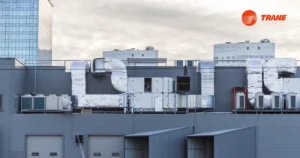Across the globe, industries are becoming more interconnected, competitive, and demanding than ever before. Whether it is manufacturing, technology, healthcare, or logistics, one element consistently underpins success: reliable and efficient cooling. In environments where extreme climates, supply chain pressures, and rapid digitalization are shaping decisions, businesses need proven solutions that guarantee operational stability. The air cooled chiller has emerged as one of the most versatile systems, delivering dependable temperature control that keeps factories, hospitals, warehouses, and data centers running smoothly.
Cooling as a Critical Business Driver
Cooling is no longer an afterthought or a simple support system. For today’s organizations, it is a mission-critical component of operations. Consider the case of global pharmaceutical companies, where products must be manufactured, stored, and transported at precise temperatures. Even minor fluctuations can compromise safety, efficacy, and compliance. Similarly, in the fast-growing technology sector, data centers must operate 24/7 without overheating. A single cooling failure can bring down entire networks, leading to financial loss and reputational damage. These examples illustrate that effective cooling is about more than comfort — it is about protecting business continuity.
Why Air Cooled Systems Excel Globally
One of the primary reasons the air cooled chiller has gained such widespread adoption is its adaptability. Unlike water-cooled alternatives, which require access to extensive water supplies and cooling towers, air-cooled units function efficiently in areas where water resources are limited. This makes them ideal for regions facing water scarcity, such as the Middle East and parts of Africa, as well as in fast-expanding industrial hubs where water infrastructure may not yet be fully developed.
These systems also have a smaller footprint and simpler installation requirements, allowing companies to deploy them quickly without major structural changes. For multinational organizations expanding into new markets, this combination of efficiency and ease of deployment is invaluable.
Applications Across Diverse Industries
The versatility of air-cooled systems is evident in their widespread use across sectors:
- Data Centers: Cooling is the backbone of digital infrastructure. Air-cooled units help prevent overheating of servers and storage systems, ensuring uninterrupted access to financial services, telecommunications, and government operations.
- Healthcare: Hospitals, clinics, and laboratories depend on reliable cooling to maintain sterile environments, safeguard medicines, and support life-saving technologies.
- Food and Beverage: From production lines to cold storage facilities, cooling guarantees freshness, safety, and compliance with international standards.
- Manufacturing: Industrial equipment generates significant heat. Air-cooled technology regulates machinery temperatures, reducing downtime and extending the life of assets.
- Logistics and Retail: Warehouses and large shopping complexes rely on efficient cooling to maintain product quality and deliver comfortable customer experiences.
By serving these varied industries, air-cooled systems play a vital role in sustaining global economies.
Sustainability as a Strategic Imperative
Sustainability is no longer optional. Governments, investors, and customers are all demanding greener practices, and businesses must adapt or risk being left behind. Air-cooled systems are advancing rapidly in this area. Many incorporate eco-friendly refrigerants, advanced controls, and energy optimization features that lower carbon footprints while reducing utility costs. For global organizations, adopting these technologies provides not only an environmental advantage but also a competitive one.
Scalability and Flexibility
Another distinguishing feature of these systems is scalability. In industries where demand can change suddenly — such as retail during peak seasons or healthcare during emergencies — the ability to scale up or down quickly is essential. Modular air-cooled units can be added or removed as required, allowing businesses to respond to shifting conditions without overspending on infrastructure that may sit idle during quieter periods.
Managing Risk Through Reliability
Risk management is a central focus for global executives. Cooling systems represent a significant part of that equation. When temperatures rise unexpectedly, downtime can translate into millions of dollars in losses. Air-cooled systems provide peace of mind by operating effectively under a wide range of environmental conditions. Their straightforward design reduces the likelihood of breakdowns, and when paired with Trane’s global service expertise, organizations can ensure maintenance and monitoring are seamless.
Real-World Case Applications
For example, a large-scale automotive manufacturer operating in both Europe and Asia faced challenges due to fluctuating production volumes and regional climate variations. By adopting air-cooled systems, the company achieved stable cooling performance without investing in extensive water infrastructure. Similarly, in Latin America, a leading food distribution company integrated air-cooled technology into its logistics hubs, ensuring consistent temperature control even in high-humidity conditions. These real-world applications highlight the universal adaptability of the technology.
Innovation and the Future of Cooling
The future of industrial cooling is being shaped by digitalization. Smart sensors, predictive analytics, and remote monitoring are being integrated into modern systems, allowing businesses to predict failures before they occur, optimize energy use, and extend equipment lifecycles. Trane’s investment in these innovations ensures that air-cooled solutions are not only effective today but also ready for the challenges of tomorrow’s industries.
Closing Thought
Global businesses need cooling solutions that deliver efficiency, reliability, and scalability across industries and regions. By choosing Trane, organizations benefit from cutting-edge technology, expert deployment, and global service excellence. With advanced cooling rental options, Trane ensures that companies can access flexible, cost-effective solutions that safeguard continuity, strengthen resilience, and support long-term growth in an increasingly competitive world.




